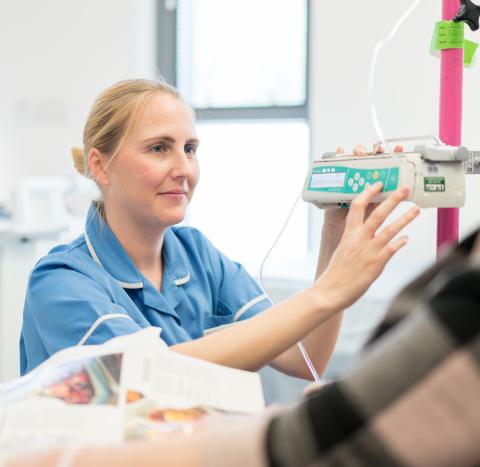The idea
The aim of the project led by Dr Agnieszka Michael at the University of Surrey was to assess whether elemental diet, is an acceptable form of nutrition in patients with inoperable bowel obstruction.
Project background
Many women with advanced ovarian cancer develop a blockage in the bowel, which is often inoperable. This means that women can be unable to eat and may only be able to drink small amounts. This stops women from being able to absorb essential food and nutrients. Providing the right nutritional support is challenging, as the recommended parenteral (though a vein) feeding is not widely available.
In an elemental diet, nutrients including amino acids, fats sugars, vitamins and minerals are given either as a liquid drink or by a gastric feeding tube. The nutrients in elemental diets are easily digested and mainly absorbed in the upper small intestine which means that they can be of use to patients with inoperable bowel obstruction as this usually occurs lower down in the gut.
Project plan
The study aimed to answer the following questions:
-
Is elemental diet tolerated by patients with inoperable bowel obstruction (do patients like the taste, does it make the nausea worse, does it make abdominal pain worse?)
-
Does the elemental diet improve quality of life?
-
Can the elemental diet meet some of the nutritional requirements for patients?
The project was a mixed-method single arm feasibility study. This means that all patients were given the elemental diet, and researchers collected numerical data (for example about the number of patients experiencing nausea) and interviewed patients to find out their experience of taking the elemental diet.
This research will provide evidence that will help to define the optimal management of patients with inoperable bowel obstruction.
Research results
The trial has now completed and is at the stage of final analysis.
The trial recruited 29 women, average age 68 years with inoperable bowel obstruction caused by ovarian, fallopian, primary peritoneal, or endometrial cancer.
Preliminary results show that most people tolerated the treatment that it didn’t worsen pain of vomiting.
Why is this research important to those affected by ovarian cancer?
We are still waiting for the analysis of the study that would show whether this feeding method will improve patients’ quality of life.
Fact file
Researcher: Dr Agnieszka Michael
Institution: University of Surrey
Project dates: April 2017 to November 2020
Funding awarded: £64,898
Project status: complete




